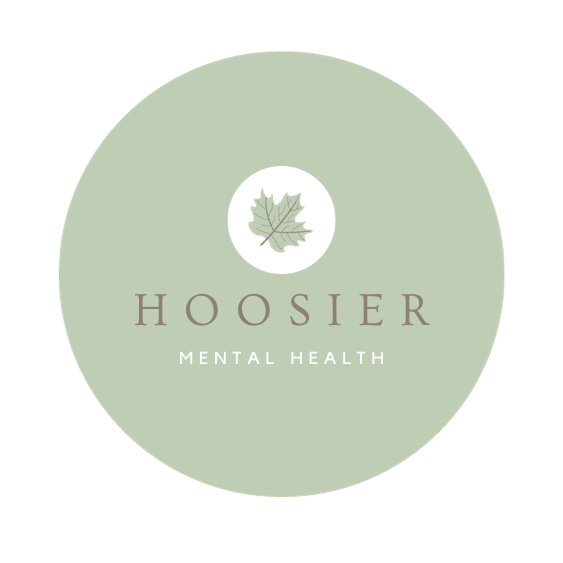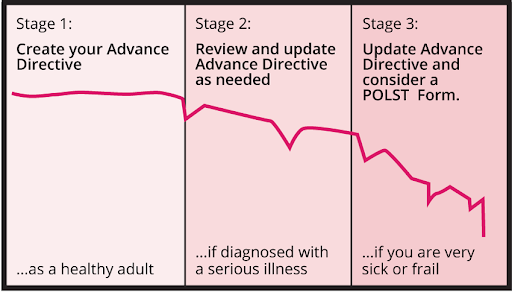Advance Care Planning: A Gift for Our Dignity and Our Loved Ones
When working in numerous healthcare settings, one of my job roles was talking about Advance Care Planning. This is one of my favorite conversations to have with people because it often opens conversations to many other topics. It would help me get to know my patients in ways that allow me, their healthcare team, and their loved ones to have meaningful discussions about their holistic care and wishes for care in the event they become critically ill. It also breathed my patients’ lives and voice into countless healthcare decisions that needed to be made when they were unable to speak for themselves.
What is Advance Care Planning?
Advance Care Planning is a series of mindful discussions with your family, doctor and healthcare team, Social Worker, spiritual or religious advisor, and ourselves to outline the types of treatment you would want in the event you became critically ill and could no longer speak for yourself. These conversations happen when you are still able to speak for yourself and share your perspective. It serves as a guide to your loved ones if they must make decisions on your health that ensures that your dignity, worth, and important beliefs on your life are held to the highest regard.
Advance Care Planning documents such as the Advance Directive are used as a guide to: identify specific people you would like to make healthcare decisions for you, describe your preferences for how you would want to be treated, describe preferences for medical care, mental health care, and long-term care, and list other elements of importance in your life. You can complete these documents with special attention to your faith, such as no blood transfusions or the importance of including prayer, or other religious elements of importance as it relates to your healthcare.
Forms like the POLST (also known as Physician’s Order for Life-Sustaining Treatment, Portable Order for Life-Sustaining Treatment, Provider’s Order for Life-Sustaining Treatment, etc.) provide medical orders for treatment in an emergency. Each state calls the form something different, but it guides EMS and the emergency room providers on what to do if you suddenly go unresponsive and need immediate care like CPR. If you are on dialysis, it is quite likely that your clinic has asked you if you have one and may have helped you with completing it. POLST.org has several great videos and resources explaining the form in greater detail. You can also lookup your state’s specific information on their site as well.
Who is Advance Care Planning For?
Advance Care Planning is for anyone over the age of 18. Accidents happen, pandemics happen, and illness happens at any age and does not discriminate. Advance Care Planning should be an ongoing conversation throughout your life as your health, needs, and perspective changes. You may start to consider Advance Care Planning as an important topic to discuss if:
You have recently been diagnosed with a serious, chronic, or terminal condition or injury
Your existing health condition has declined
A loved one has died
You have previously completed an Advance Directive, but your wishes or decision-maker have changed
You have lived through an evolving pandemic and countless natural disasters (everyone!)
My Dignity, My Voice, Your Gift
Working with patients who suddenly had a stroke, I would participate in care plan meetings with doctors, nurses, clergy, and family members regularly. I cannot tell you how many family members would share that they never had conversations on what they would want if they became ill. This made their crisis that much harder, as they wanted to make sure they were taking care of their loved one in the way that honors their dignity and voice. This is the point where we would begin to discuss substituted judgment, where we would have to consider what the person would say if he or she were sitting in the room with us and learned about their prognosis for recovery or survival and treatment options. This situation occurred time and time again. Seeing the pain in their loved ones’ eyes as they learned about the patient’s illness was only compounded by not knowing if the decision they were making is “the right one”.
Advance Care Planning not only ensures that you receive treatment that is dignified by your previously spoken wishes, but it is also a gift to your loved ones. Having a completed Advance Care Planning document allows them to honor you and your treatment wishes. It reduces feelings of guilt, shame, and the risk of more complicated bereavement in the future. It is truly an act of love and an invaluable gift for your trusted loved ones to be able to guide treatment according to your wishes!
Myths
Here is a list of common myths about Advance Care Planning that I frequently heard:
Talking about death brings my death closer. We are humans who will become sick and will die at some point. While it is a very difficult topic to discuss, it does not cause your health to decline or your death to occur.
I won’t get treatment if I complete a POLST or Advance Directive. The purpose of completing the forms and talking about them with your loved ones ahead of time ensures that you have people to advocate for the right treatment for you. It is getting the treatment you have decided you would or would not want should you become seriously ill.
My decision-maker will be held financially responsible. Advance Care Planning documents such as the Advance Directive or POLST are strictly for healthcare decisions. This means that your decision-maker is not going to accrue any debt. It also means that your decision-maker cannot make financial decisions on your behalf, as the documents do not cover any financial topics. If you would like to designate someone to manage your financial affairs, completing a financial power of attorney or adding a trusted loved one onto your bank accounts might be the way to go.
I give up my right to make my own decisions. This one is perhaps the most common myth I have heard. Your healthcare team will always speak to you about your health, any decisions that need to be made, and treatment options first. There are many safeguards in place that are used to ensure that you can make your own decisions. While you can give permission to the team to speak to your loved ones as well, these documents do not take effect until you have lost this ability to do so on your own.
My Advance Directive must be notarized. While you can have the form notarized, it is just as valid if it is witnessed by two people who are not your decision-makers.
How Do I Get Started?
Step 1: Talk about it—with trusted loved ones, your priest or spiritual advisor, and your doctor
Step 2: Write it down—Complete an Advance Directive or POLST. Be mindful of who you choose to be your decision-maker(s).
Step 3: Share it—Provide a copy to your decision-makers and your doctor. Keep the original somewhere safe, but inform your decision-makers where it is kept.
Step 4: Review it—If you last completed one in 1995, your wishes or decision-makers may have changed. If this is the case, be prepared to create a new form. Repeat steps 1-3.
Thanks for reading! Have you had these sorts of conversations with your family? Are you apprehensive to talk about Advanced Care Planning? Comment below!





